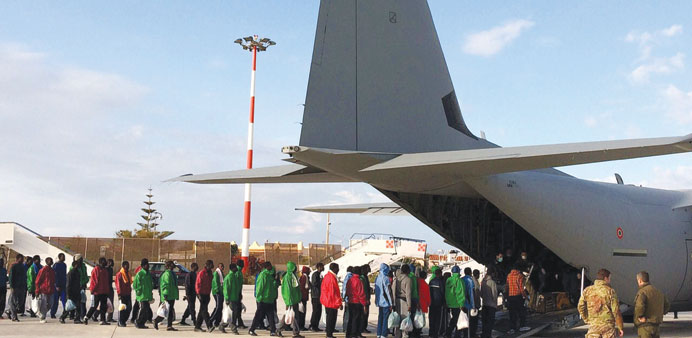Migrants boarding a military plane to be transferred at the Lampedusa airport in Italy this week. They were among some 3,800 would-be immigrants to Europe rescued in the Mediterranean since last Friday, according to figures compiled by the International Organisation for Migration.
By Giles Merritt/Brussels
In the wake of the terrorist attacks in Paris, world leaders linked arms but not ideas. The attacks unleashed a welter of opinion about how to prevent further violence. But the focus of that debate risks eclipsing the much wider question of whether Europe has sown the seeds of disaffection through neglect of its immigrants.
Exactly 20 years ago, French moviegoers were shocked by a gritty, low-budget black-and-white film called La Haine (Hatred) that conveyed the poverty and sense of hopelessness in a run-down immigrant district of Paris.
In the film, disaffected youngsters clash with police and go on a killing spree. The only thing that has changed since then is the growth of religious fundamentalism and the radicalisation of some young people.
Only French Prime Minister Manuel Valls – the son of Spanish immigrants – has highlighted the issue, referring to the “social and ethnic apartheid” that has developed in his country.
The need to address this outcome in France and across Europe has become more important than ever, as rioting and criminality by young and underprivileged immigrants are matched by the rise of far-right political parties.
Europe cannot afford ethnic confrontation; on the contrary, with their ageing, shrinking populations, European countries badly need more immigrants. The statistics are confusing and sometimes contradictory, but the European Union’s current foreign-born population of some 33mn may grow by a further 100mn immigrants by mid-century. These are the people who will sustain Europe’s tax-paying workforce at current levels.
To be sure, it is not easy to integrate immigrants from Arab countries and Sub-Saharan Africa – arriving in EU countries at an annual rate approaching 2mn – into European society. Their skills and education levels often confine them to low-paid work. But that does not mean that successive generations must be condemned to second-class citizenship.
Schools and adequate housing are crucial for integration and the creation of productive members of society. But a glance at the immigrant districts of any major European city reveals a picture of under-spending and neglect. It has been a false economy, of course, as statistics show that unemployment among young people in immigrant communities correlates with surging crime figures.
The European Commission’s new president, Jean-Claude Juncker, is championing an ambitious plan to kick-start the European economy by investing more than €300bn ($348bn) in infrastructure projects. In light of the tragic events in Paris, he should be harnessing the outpouring of solidarity to transform his plan into an agenda for improving the living conditions of Europe’s immigrant communities.
In Brussels, EU officials are busily assessing cross-border projects like road and rail links, hoping that a concerted construction programme can fend off the spectre of deflation haunting many member countries. The fear is that once wages and incomes begin to fall, the EU will move from the doldrums of recent years into an outright depression that could take decades to escape.
Supporters of Juncker’s investment plan point to Franklin D Roosevelt’s New Deal in the US in the 1930s. The federal government’s construction binge – a concrete cornucopia of dams, roads, ports, and much else – helped America overcome the Great Depression.
A New Deal for Europe could be equally promising. But it should be a new deal for Europe’s current and future immigrants. The economic stimulus to be gained from modernising the slum tower blocks that house so many immigrant families would be equal, and probably greater, than that of building super-highways.
And investments in new schools and improved education for immigrant children and job seekers would be certain to pay off handsomely.
Rebranding Juncker’s plan as a strategy for the new Europeans of tomorrow could also bring political benefits. Many mainstream politicians, not just in France but across Europe, fear that the Paris attacks will fuel support for far-right populist and anti-immigrant parties, and facing down such forces will be a tough challenge.
But Europe’s voters must be told in no uncertain terms that, without immigrants, the EU economy is doomed to shrink – and with it their living standards. A determined EU-wide strategy for integrating immigrants socially and economically would help take the wind out of chauvinist sails.
At this point in Europe’s history, only a multicultural society can deliver economically. The sooner Europeans accept that, the better they will be able to combat the threat of violence. - Project Syndicate
♦ Giles Merritt is rditor of Europe’s World and heads the Brussels-based think tank Friends of Europe.

